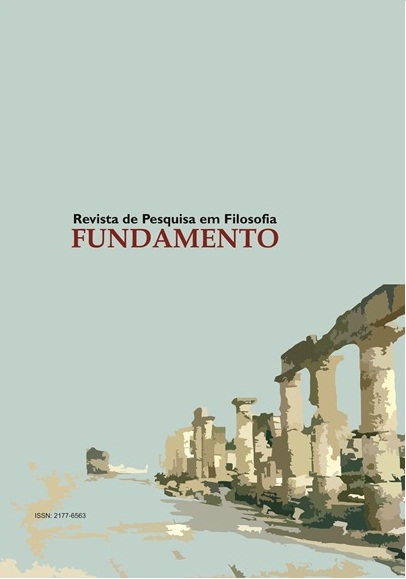Resolvendo o problema cético
Resumo
Muitos dos mais celebrados, intrigantes e poderosos argumentos céticos procedem por meio de hipóteses céticas. Reduzidos ao seu essencial, grosso modo, eles possuem a seguinte forma, onde “O” é uma proposição sobre o mundo externo que alguém comumente pensaria que sabe (e.g., tenho mãos1) e “H” é uma hipótese cética convenientemente escolhida (e.g. sou um cérebro sem corpo numa cuba que foi eletro-quimicamente estimulado para ter precisamente as experiências sensoriais que tive, doravante um BIV2):Referências
Brueckner, Anthony L. (1985) “Skepticism and Epistemic Closure.” Philosophical Topics 1
3:89-117.
Brueckner, Anthony L. (1986) Review of Unger, Philosophical Relativity, Journal of
Philosophy 83: 509-17.
Cohen, Stewart (1987) “Knowledge, Context, and Social Standards.” Synthese 73: 3-26.
Cohen, Stewart (1988) “How to be a Fallibilist.” Philosophical Perspectives 2: 91-123.
DeRose, Keith (1989) “Reid’s Anti-Sensationalism and His Realism.” Philosophical Review
98: 313-48.
DeRose, Keith (1990) “Knowledge, Epistemic Possibility, and Scepticism.” Ph.D. diss.,
University of California, Los Angeles.
DeRose, Keith (1991) “Epistemic Possibilities.” Philosophical Review 100: 581-605.
DeRose, Keith (1992) “Contextualism and Knowledge Attributions.” Philosophy and
Phenomenological Research 52: 913-29.
Dretske, Fred (1970) “Epistemic Operators.” Journal of Philosophy 67: 1007- 23.
Dretske, Fred (1971) “Conclusive Reasons.” Australasian Journal of Philosophy 49: 1-22.
Dretske, Fred (1981a) “The Pragmatic Dimension of Knowledge.” Philosophical Studies 40:
363-378.
Dretsk, Fred (198l b) Knowledge and the Flow of Information. Cambridge: MIT Press,
Bradford Books.
Forbes, Graeme (1984) “Nozick on Scepticism.” Philosophical Quarterly 34: 43-52.
Goldman, AlvinI (1976) “Discrimination and Perceptual Knowledge.” Journal of Philosophy
73: 771-91.
Lewis, David (1979) “Scorekeeping in a Language Game.” Journal of Philosophical Logic 8:
339-59.
Luper-Foy, Stephen, ed. (1987) The Possibility of Knowledge: Nozick and His Critics. Totowa,
NJ.: Rowman & Littlefield.
Nozick, Robert (1981). Philosophical Explanations, 167-228. Cambridge: Harvard
University Press.
Reid, Thomas (1895) The Works of Thomas Reid, 8th ed., ed. William Hamilton. Edinburgh:
James Thin.
Stine, Gail C. (1976) “Skepticism, Relevant Alternatives, and Deductive Closure.”
Philosophical Studies 29: 249-61.
Stroud, Barry (1984) The Significance of Philosophical Scepticism. Oxford: Oxford University
Press.
Unger, Peter (1975) Ignorance: A Case for Scepticism. Oxford: Oxford University Press.
Unger, Peter (1984) Philosophical Relativity. Minneapolis: University of Minnesota Press.
Unger, Peter (1986) “The Cone Model of Knowledge.” Philosophical Topics 14: 125-78.
3:89-117.
Brueckner, Anthony L. (1986) Review of Unger, Philosophical Relativity, Journal of
Philosophy 83: 509-17.
Cohen, Stewart (1987) “Knowledge, Context, and Social Standards.” Synthese 73: 3-26.
Cohen, Stewart (1988) “How to be a Fallibilist.” Philosophical Perspectives 2: 91-123.
DeRose, Keith (1989) “Reid’s Anti-Sensationalism and His Realism.” Philosophical Review
98: 313-48.
DeRose, Keith (1990) “Knowledge, Epistemic Possibility, and Scepticism.” Ph.D. diss.,
University of California, Los Angeles.
DeRose, Keith (1991) “Epistemic Possibilities.” Philosophical Review 100: 581-605.
DeRose, Keith (1992) “Contextualism and Knowledge Attributions.” Philosophy and
Phenomenological Research 52: 913-29.
Dretske, Fred (1970) “Epistemic Operators.” Journal of Philosophy 67: 1007- 23.
Dretske, Fred (1971) “Conclusive Reasons.” Australasian Journal of Philosophy 49: 1-22.
Dretske, Fred (1981a) “The Pragmatic Dimension of Knowledge.” Philosophical Studies 40:
363-378.
Dretsk, Fred (198l b) Knowledge and the Flow of Information. Cambridge: MIT Press,
Bradford Books.
Forbes, Graeme (1984) “Nozick on Scepticism.” Philosophical Quarterly 34: 43-52.
Goldman, AlvinI (1976) “Discrimination and Perceptual Knowledge.” Journal of Philosophy
73: 771-91.
Lewis, David (1979) “Scorekeeping in a Language Game.” Journal of Philosophical Logic 8:
339-59.
Luper-Foy, Stephen, ed. (1987) The Possibility of Knowledge: Nozick and His Critics. Totowa,
NJ.: Rowman & Littlefield.
Nozick, Robert (1981). Philosophical Explanations, 167-228. Cambridge: Harvard
University Press.
Reid, Thomas (1895) The Works of Thomas Reid, 8th ed., ed. William Hamilton. Edinburgh:
James Thin.
Stine, Gail C. (1976) “Skepticism, Relevant Alternatives, and Deductive Closure.”
Philosophical Studies 29: 249-61.
Stroud, Barry (1984) The Significance of Philosophical Scepticism. Oxford: Oxford University
Press.
Unger, Peter (1975) Ignorance: A Case for Scepticism. Oxford: Oxford University Press.
Unger, Peter (1984) Philosophical Relativity. Minneapolis: University of Minnesota Press.
Unger, Peter (1986) “The Cone Model of Knowledge.” Philosophical Topics 14: 125-78.
Publicado
2017-04-01
Como Citar
Marques Segundo, L. H. (2017). Resolvendo o problema cético. Virtualia Journal, 1(9). Recuperado de https://periodicos.ufop.br/virtualia-journal/article/view/2419
Seção
TRADUÇÃO


.jpg)
